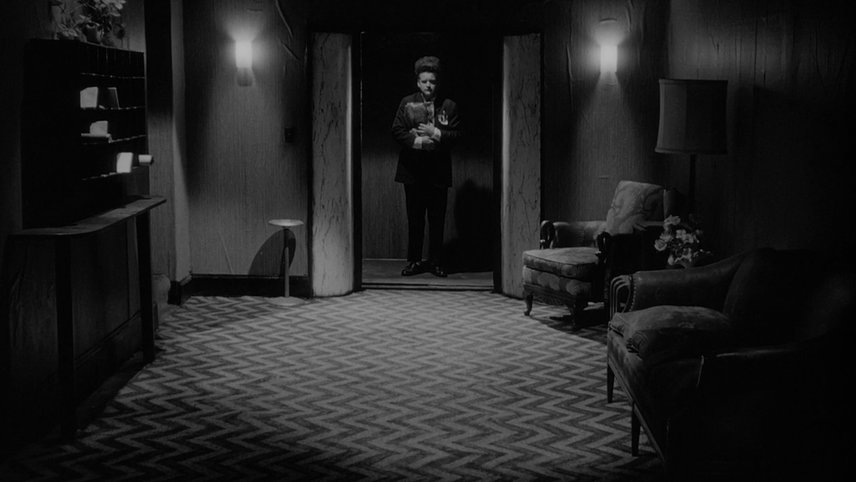This summer I’m watching every David Lynch movie ever, as part of the Alamo Drafthouse’s The Complete David Lynch series. These are my notes. Don’t take them seriously.
At a downtown Austin bar in the early evening, I sip a strong beer, and try to remember the last time I saw Eraserhead. It’s been at last 15 years.
I first saw it in high school–that much I know. In those days, Ontario schools were still tracked, and I attended an “arts” school, full of weirdos and musicians and future film students. (Our claim to fame was–and probably still is–that James Cameron also attended. He wrote The Abyss while roaming those same halls. Still a sci-fi dreamer, still years from becoming an eccentric, mega-rich submarine pilot.) The school attracted creative types, and I was constantly in the orbit of strange and interesting people. For me, high school was a four-year crash course on extreme music, underground art, fringe politics, drug culture, and movies.
Every weekend, we’d gather in the basement of a friend whose parents were permanently gone, and whose adult guardian was, you know, cool. We’d stay up late, drinking, listening to music, talking about anything and everything, and watching videotapes. I lived for those nights. Of all the things I saw in that basement, a few stand out as thematically related and ultimately unforgettable: the Alien Workshop video (as much a work of cultural collage art as it is a skate video), Faces of Death (which we didn’t know at the time was largely fake), and Eraserhead. All three were strangely impressive. And all three were unsettling and subversive and deconstructionist in ways that would take me a decade to fully grasp.
I had no idea who David Lynch was at the time, and I remember being blown away by how deeply repulsive but undeniably mesmerizing Eraserhead was. How could those two qualities coexist? The obvious scenes stuck in my memory: the lady in the radiator, the dinner scene, the deformed baby. It seemed as if there was a hidden message, floating just below the surface, waiting to be understood. Like a Rubik’s Cube that just needed a few more twists. But ultimately, I didn’t know what it meant, and in the few times I’ve seen it since then, I’m not sure I’ve made any progress at all in figuring it out.
Fast forward to now. I strike up a conversation with the couple sitting next to me, one of whom is wearing an Eraserhead hoodie (a clear sign that they’re also going to tonight’s screening). I ask about their history with the film. The woman says, “When we first started dating, he made me watch it. He said that if we were going to date, I needed to sit through it. It was a test.” Which makes total sense to me–though I admittedly have no idea what is being tested, or what should rightly constitute passing or failing.
Before the film starts, we’re encouraged to spend a minute in meditation, to prepare us for what we’re about to experience. I take this very seriously, and attempt to calm my thoughts, in anticipation of what I already know is a monumentally confounding piece of cinema. I focus on my breathing, and prepare to accept whatever comes.
Seeing Eraserhead anew, most of what I notice about it is formal. The use of sound: constant, rumbling, organic hums, rattles, and buzzes (apparently Lynch obsessed over this). The first appearances of some iconic Lynchian visual elements: the chevron patterned floor, the superimpositions and long cross dissolves, the framing. John Nance’s highly nuanced performance. Knowing what I now know about Lynch, it’s hard not to search for these stylistic (but technical) trademarks, and there’s a surprising wealth of them.
But when it comes to themes–to meaning–I’m still utterly stumped. If anything, Eraserhead seems (in a career full of challenging works) even weirder than I remember, and maybe the most impenetrable of all Lynch’s films. The story, such as it is, seems loosely concerned with antipathy, isolation and fragility. But in the filthy, forgotten world of the film, there are also definite flickers of deep beauty, hope, and wonder. I definitely feel pity and love for the god forsaken baby-creature in a way I don’t remember feeling before–an innocent victim of nature, born into dying, hideous but (as a baby) innately beautiful.
Given these competing interests, I’m tempted to think that Eraserhead is not really about anything at all. It’s obviously more of a mood piece than a narrative film, but what if it’s only a mood piece? What if it’s purely the frame of a mirror, onto which we project our own themes and hopes and nightmares? And if so, what’s a healthy reaction to it? Am I terrified by Eraserhead, or am I terrified by my own worldview?
Walking outside, into the filth and revelry of Sixth Street in the summertime, I’m stirred (in a good way) by the experience I’ve just had. I walk around a little, and try to work through what I’ve seen. I haven’t made any grand realizations, and don’t have confidence that I will. But maybe I’m seeing some dots that’ll begin to connect as we move on to The Elephant Man? Or maybe these mysteries will just be replaced by new ones? I guess we’ll see.
